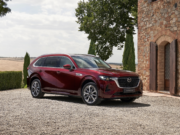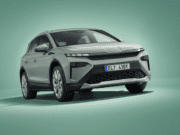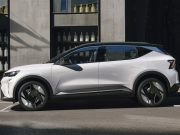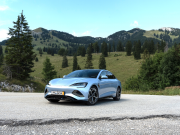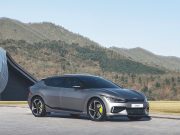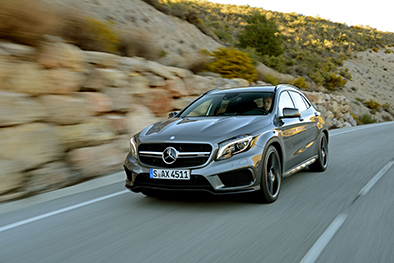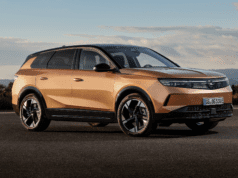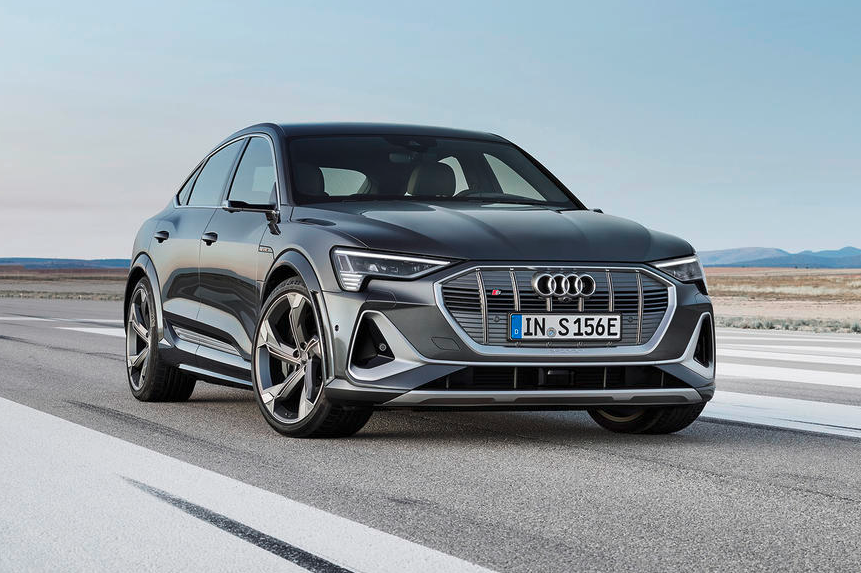 Audi is continuing with its electric offensive – with the new Audi e‑tron S and the new Audi e‑tron S Sportback. Both of the S models with fully electric drive use three electric motors, two of which operate on the rear axle. Their intelligent drive control raises vehicle safety, and dynamic handling in particular, to a new level. In addition to the electric all-wheel drive, the vehicles are equipped with electric torque vectoring with active and fully variable torque distribution on the rear axle.
Audi is continuing with its electric offensive – with the new Audi e‑tron S and the new Audi e‑tron S Sportback. Both of the S models with fully electric drive use three electric motors, two of which operate on the rear axle. Their intelligent drive control raises vehicle safety, and dynamic handling in particular, to a new level. In addition to the electric all-wheel drive, the vehicles are equipped with electric torque vectoring with active and fully variable torque distribution on the rear axle.
Handling 2.0: the driving experience
The new Audi e‑tron S and the new e‑tron S Sportback deliver dynamics in a new dimension. In S gear, they provide their full boost performance for eight seconds – 370 kW of power and 973 Nm of torque. The standard sprint takes just 4.5 seconds and acceleration ends at 210 km/h.
The new S models have two electric motors on the rear axle and one on the front axle, making them the first mass-produced electric cars in the world to have three electric motors. Their drive layout is based on the modular construction principle: An adapted design of the more powerful electric motor that powers the rear axle in the Audi e‑tron 55 is now installed on the front axle. The front electric motor from the e‑tron 55 operates together with a structurally identical counterpart and individual modifications in the rear. The high-voltage battery has a gross energy capacity of 95 kWh, of which 91 percent (86 kWh) is usable. With one battery charge, the Audi e‑tron S and the Audi e‑tron S Sportback achieve ranges of up to 360 kilometres and 365 kilometres (preliminary values), respectively, in the WLTP cycle.
quattro reloaded: electric torque vectoring
In order to improve efficiency, only the rear electric motors are engaged as long as the Audi e‑tron S and the e‑tron S Sportback are operating in normal driving mode. The front electric motor flashes into action when the driver demands more performance, or predictively before traction subsides. Electric all-wheel drive is now enhanced with electric torque vectoring: Each of the rear electric motors sends the drive torques directly to the respective wheel via a single-speed transmission; there is no more mechanical differential. Need-based regulation takes just milliseconds and can manage very high drive torques.
Drivers experience the excellent agility and traction of the electric S models in particular when challenging them on curvy roads. Their character has a stronger emphasis on the rear end and is even sportier than that of the technical basis. If the ESC stabilisation control is set to “sport” and the Audi drive select dynamic handling system is set to maximum performance in “dynamic” mode, the drive layout facilitates a high level of transverse dynamics and, upon request, controlled drifts as well. When approaching the physical limit, the unloaded front wheel on the inside of the curve is decelerated slightly via the wheel brake to prevent slip and further refine handling. The sharp dynamism, high level of precision, and uncompromising safety are based on the close networking between all control units that manage the drive and suspension systems.
Networking: the suspension of the electric S models
The large high-voltage battery ensures a balanced distribution of the axle loads and is installed in a low position comparable to that of the three electric motors. This lowers the car’s center of gravity, which offers great advantages in terms of handling. The progressive steering, whose ratio becomes increasingly direct as the steering movement increases, emphasises the sporty character. The suspension has S-specific tuning. The Audi drive select system offers seven driving profiles. The electric S models are equipped with 20-inch wheels as standard and come with tyres that are already 285 millimetres (11.2 in) wide.
Innovative solutions: aerodynamics.
Thanks to the optional virtual exterior mirrors (cameras that send their pictures to high-contrast displays in the interior) in particular, the Audi e‑tron S models achieve very good drag coefficients. Flow-optimised wheel arch extensions also make a considerable contribution to resolving the conflict of objectives between outstanding aerodynamics and a sporty look. The innovative technology was developed by Audi and is now patented. The premium brand is introducing it to large-scale vehicle construction for the first time. This allows the Audi e‑tron S Sportback** to achieve a drag coefficient of just 0.26, despite the widening of its wheel arches; in the Audi e‑tron S**, the drag coefficient is 0.28.
A second major element in the aerodynamics concept is the controllable cooling-air inlet with ducts to cool the front wheel brakes. It remains closed as often as possible so that the airstream flows over the hood with almost no turbulence. As part of efficient thermal management, each e‑tron is equipped with a heat pump as standard. It draws heat energy from the waste heat of the drive components, thereby increasing the range by up to ten percent.
The sophisticated recuperation concept also contributes to the vehicle’s efficiency. Drivers can select between three recuperation levels, the highest of which allows them to experience a noticeable one-pedal feeling. When braking, the electric motors decelerate alone up to the area of 0.3 g, i.e. in most everyday situations. The hydraulic wheel brakes only come into play beyond that level. However, the electric motors remain active and can convert up to 270 kW of peak performance when braking from a speed of 100 km/h.
Five centimetres (2.0 in) more width: the exterior design
The Audi e‑tron S** and the Audi e‑tron S Sportback** reveal their electric power at first glance. Their front and rear bumpers have strong contours, and the air curtains are particularly large and expressive. The diffuser insert at the rear end extends almost across the entire vehicle width. The fact that the wheel arches on both sides are 23 millimetres (0.9 in) wider makes the cars appear very powerful.
In the autumn: market launch in Europe
The two electrically powered S models will be launched on the European markets in Autumn 2020 With Irish pricing to be revealed closer to the time.






